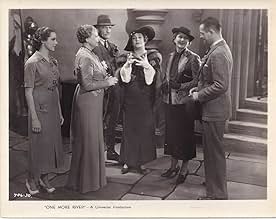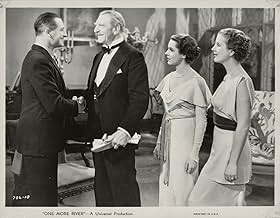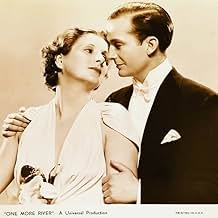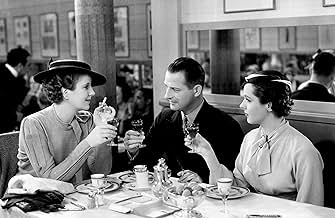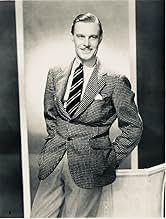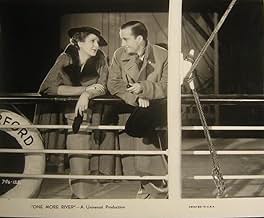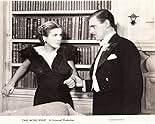Aggiungi una trama nella tua linguaA young lady leaves her brutal husband and meets another man aboard a ship.A young lady leaves her brutal husband and meets another man aboard a ship.A young lady leaves her brutal husband and meets another man aboard a ship.
- Regia
- Sceneggiatura
- Star
Recensioni in evidenza
A woman finds herself sued for divorce by the brutish husband who beat her with a riding whip. The kind of situation that would be unthinkable today but which was probably considered to be quite saucy back in the 1930s, despite the terribly proper tone of R. C. Sheriff's screenplay. When Dana Wynyard and Frank Lawton both gaze beyond the camera, and he says, ever so matter-of-factly, "You realise, of course, that I love you," it's impossible not to laugh. It's a pleasant enough watch, but it's tone is inconsistent and often inappropriately humorous
Saw this as part of Cinefest 2009 in Syracuse, and it was a revelation. Not that it doesn't stir high expectations: a Galsworthy novel, adapted by playwright R.C. Sheriff (author of the great antiwar play "Journey's End"), directed with great assurance by James Whale, and with a near-amazing cast. As an abused high society wife trying to wrench free of her extremely nasty husband, Diana Wynyard is ladylike and touching. A very young Jane Wyatt is her confidante, Henry Stephenson is a helpful lawyer relative, and Frank Lawton is the appealing young man who falls in love with her. All are upstaged by Mrs. Patrick Campbell, a formidable presence bellowing every line with relish, and she It's remarkably adult for its day, with a modern attitude about adultery (our heroine doesn't, but the movie seems to believe she should). It's literate and fast-moving, and sandwiched between Whale's "The Invisible Man" and "The Bride of Frankenstein," it's one of several examples of how assured he was outside of the horror genre.
"One More River" (1934) stars Diana Wynyard, Frank Lawton, Colin Clive as top-liners, but the rest of the cast is stellar! Mrs. Patrick Campbell, C. Aubrey Smith, Jane Wyatt, Reginald Denny, Henry Stephenson, Lionel Atwill, Alan Mowbray, Kathleen Howard, Gilbert Emery, E. E. Clive, and the list just keeps on going. This Universal Studios produced film will have most thinking it was made in England, as most of the stars and even the sets are about as English as can be. Beautifully appointed and directed by James Whale, just after coming off of "The Invisible Man" and just prior to "Bride of Frankenstein", this was more of a diversion for Whale, yet he handles it with major aplomb. Many today will consider the theme of suit for divorce based on adultery rather tame, and this would have had even more of a jolt in 1934 had the Code not just gone into effect, but the finished product still has the ability to hold our attention. Wynyard had just come off of her nomination for Best Actress Oscar for "Cavalcade", but she's much better here, and her quiet, if not elegant, though stolid performance serves the part well. She's matched by the ruthless, somewhat fey, but catty nastiness of her film husband, Colin Clive, in a part that shows he had genuine talent that captured range. Frank Lawton, who passionately loves Wynyard, and who is accused of being the co-respondent in the case against Wynyard, is less well-suited, but effective enough.
Written by John Galsworthy, this was much more potent when first released as a novel, but Whale has whittled the novel down to 88 minutes of film, and he's done it very effectively. The film is talkative, but its pristine presentation still packs a punch. Gorgeous cinematography, good direction, fine acting all around - this is recommended highly actually, though many today will wonder what all the hoopla is about. In effect, the film is now dated, and because it lacks the buzz-buzz of so much activity on screen, the CGI, the crash and bang of today's typical hit, let's say it will play better to those looking for something, not cerebral, but soap-operaish in an old-fashioned way.
Written by John Galsworthy, this was much more potent when first released as a novel, but Whale has whittled the novel down to 88 minutes of film, and he's done it very effectively. The film is talkative, but its pristine presentation still packs a punch. Gorgeous cinematography, good direction, fine acting all around - this is recommended highly actually, though many today will wonder what all the hoopla is about. In effect, the film is now dated, and because it lacks the buzz-buzz of so much activity on screen, the CGI, the crash and bang of today's typical hit, let's say it will play better to those looking for something, not cerebral, but soap-operaish in an old-fashioned way.
This is one of Whale's favorites among his own works (the director even gave himself an uncredited bit!) but which he only got Universal to bankroll by accepting to helm another fantasy project for them, the subsequently aborted "A Trip To Mars". Anyway, this obscurely-titled melodrama is based on John Galsworthy (best-known for "The Forsythe Saga")'s last novel – adapted by the equally distinguished R.C. Sheriff. It tells of the vicissitudes of a young wife (Diana Wynyard, fresh from an Oscar nomination for the previous year's Best Picture winner CAVALCADE), about to be divorced from her brutish husband (a brief but typically impressive turn from Whale regular Colin Clive), who unwittingly adds coal to the fire via her initially platonic relationship with a young man (Frank Lawton, soon to play his most notable role as the grown-up David COPPERFIELD [1935]). The narrative also has a strong political element to it, not just in view of the subplot involving the electoral climate (personified by Reginald Denny's newly-appointed MP), but in the heroine's emancipation from the rigid status quo pertaining to woman's role in society.
While undeniably dated, the film boasts splendid cinematography and sets (by BRIDE OF FRANKENSTEIN's John J. Mescall and Charles D. Hall respectively) – the latter would be memorably refurbished and re-used for the Mary Shelley prologue and the Baron's own abode in that very film which rather suggests that the art director/set decorator's craft is not nearly appreciated enough! Apart from this, we get a truly remarkable supporting cast: lovely Jane Wyatt (as Wynyard's kid sister), C. Aubrey Smith (their father), Henry Stephenson (an uncle), the oddly-named Mrs. Patrick Campbell (hamming it up as his outspoken wife – apparently, she was like that in real-life too!), Lionel Atwill (the wily but pompous Prosecutor), Alan Mowbray (the defense counsel), Gilbert Emery (the genial Judge) and E.E. Clive (the other Clive's resourceful private detective).
Finally, the copy I acquired was sourced from an old TV broadcast off the U.K.'s Channel 4: despite a couple of intermissions for publicity spots(!), the quality is surprisingly adequate – much better, in fact, than that for most of the other Whales I have been watching lately.
While undeniably dated, the film boasts splendid cinematography and sets (by BRIDE OF FRANKENSTEIN's John J. Mescall and Charles D. Hall respectively) – the latter would be memorably refurbished and re-used for the Mary Shelley prologue and the Baron's own abode in that very film which rather suggests that the art director/set decorator's craft is not nearly appreciated enough! Apart from this, we get a truly remarkable supporting cast: lovely Jane Wyatt (as Wynyard's kid sister), C. Aubrey Smith (their father), Henry Stephenson (an uncle), the oddly-named Mrs. Patrick Campbell (hamming it up as his outspoken wife – apparently, she was like that in real-life too!), Lionel Atwill (the wily but pompous Prosecutor), Alan Mowbray (the defense counsel), Gilbert Emery (the genial Judge) and E.E. Clive (the other Clive's resourceful private detective).
Finally, the copy I acquired was sourced from an old TV broadcast off the U.K.'s Channel 4: despite a couple of intermissions for publicity spots(!), the quality is surprisingly adequate – much better, in fact, than that for most of the other Whales I have been watching lately.
This is a superior film, but its impact is attenuated by the great changes in social attitudes toward sex and divorce which have occurred since the time it was filmed. The conflicts and tensions in the story could only occur today in third world nations or very religious communities. Thus, most American viewers can wonder what all the excitement is about.
Diana Wynyard is a revelation. When the film began, she appeared a bit on the plain side. However, she became enchantingly beautiful as the movie progressed. Her soft, pleasant, kind features and the exquisite shape of her head and body impressed me more and more, as did her calm manner and then her assertive testimony in court.She became irresistible.
Universal gave this a veneer of a prestige production. It looked like it was shot in England, except that most of the English performers were already old Hollywood hands. Jane Wyatt wisely didn't try for an English accent. Whales' direction was seamless, but not as flashy as his more famous horror productions. He kept things moving briskly.
Diana Wynyard is a revelation. When the film began, she appeared a bit on the plain side. However, she became enchantingly beautiful as the movie progressed. Her soft, pleasant, kind features and the exquisite shape of her head and body impressed me more and more, as did her calm manner and then her assertive testimony in court.She became irresistible.
Universal gave this a veneer of a prestige production. It looked like it was shot in England, except that most of the English performers were already old Hollywood hands. Jane Wyatt wisely didn't try for an English accent. Whales' direction was seamless, but not as flashy as his more famous horror productions. He kept things moving briskly.
Lo sapevi?
- QuizAccording to Jane Wyatt, "[James Whale] was crazy about Mrs. Pat [Mrs. Patrick Campbell]. The set was kind of run for her. The whole thing was to get her relaxed. She was playing up a lot about how nervous she was, and I think she got an awful lot of attention that way. i think we felt sorry for Mrs. Campbell. Poor dear--how ever are they going to pull her together. That was my reaction. We all had to pull her together and help her through.
- BlooperIn the opening scene, the liner pulling into the London dock that lady Corven arrives on is seen in the establishing shot is clearly named the ORFORD, yet after a we see her and Tony speak on the deck, another establishing shot of the ship now shows it is one called the ORSOVA.
- ConnessioniReferenced in Demoni e dei (1998)
I più visti
Accedi per valutare e creare un elenco di titoli salvati per ottenere consigli personalizzati
Dettagli
- Data di uscita
- Paese di origine
- Lingua
- Celebre anche come
- Över floden
- Luoghi delle riprese
- Azienda produttrice
- Vedi altri crediti dell’azienda su IMDbPro
- Tempo di esecuzione1 ora 28 minuti
- Colore
- Proporzioni
- 1.37 : 1
Contribuisci a questa pagina
Suggerisci una modifica o aggiungi i contenuti mancanti

Divario superiore
By what name was One More River (1934) officially released in Canada in English?
Rispondi
